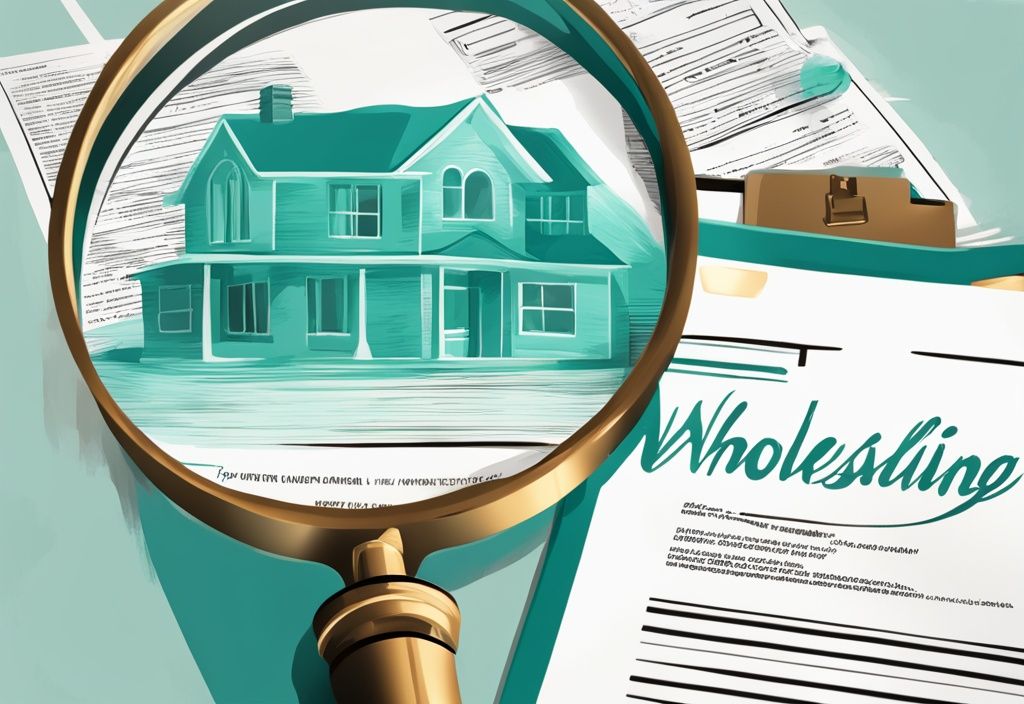Ever wondered if wholesaling real estate is legal? As your real estate ally, I understand how daunting this market can be, especially when it applies to sophisticated strategies like wholesaling. Let me tell you – you’re not alone and the answer isn’t as convoluted as you think.
In this enlightening piece, we’ll delve into the legality of wholesaling real estate as it stands in 2024. Not only will we unpack state-specific regulations, but we’ll also discuss essential legal aspects that you, as an investor, need to be aware of.
My aim is to simplify these complexities, making them digestible and hopefully less intimidating. So, come along and let’s navigate this intricate world together, enabling you to make sound and ethical decisions.
Understanding The Legality of Wholesaling in Real Estate
What is Wholesaling Real Estate?
Wholesaling real estate is all about finding motivated sellers and negotiating a contract to purchase their property. As the wholesaler, your goal is to then locate a potential buyer to whom you can assign this contract, selling your rights to the property. This is where your profit comes in, through an assignment fee—the difference between the original seller’s agreed price and the buyer’s price.
This strategy is especially appealing to beginners because it usually requires low upfront capital and can offer quick returns. But remember, the legal landscape here is nuanced. Wholesalers must act as principal buyers in these deals, not as real estate brokers. This distinction is crucial unless you have a valid real estate license that allows you to operate as a broker legally.
Is Wholesaling Real Estate Legal in all States?
The question “Is wholesaling real estate legal?” generally has a positive answer—it’s legal across all 50 states if done correctly. However, the key is to comply with the specific legal and regulatory frameworks unique to each state. Some regions have stricter rules and have introduced specific laws that affect wholesaling. States like South Carolina, Oregon, Iowa, Virginia, Illinois, Oklahoma, Arizona, and Kentucky have seen regulatory shifts that specifically target wholesaling.
Therefore, staying informed about local laws and understanding the nuances of each region is crucial. This knowledge ensures you’re compliant and helps you avoid legal issues. It’s always better to be safe than sorry, right?
The Legal Aspects of Real Estate Wholesaling
Regulations and Legislation Applicable To Wholesaling
At the heart of legally compliant wholesaling is transparency with both sellers and buyers. Clear, truthful communication about your role and the assignment process can prevent misunderstandings and potential legal problems.
Federal regulations like the Real Estate Settlement Procedures Act (RESPA) and the Dodd-Frank Act are also significant players in shaping how wholesaling transactions are conducted. These regulations are basically the rulebooks you need to follow to stay on the right side of the law.
Additionally, many states require wholesalers to hold a real estate license or work under a licensed broker. State-specific laws may also mandate that purchase and sale agreements are legally binding and sometimes even notarized. Missing out on these requirements could lead to severe penalties, including fines and other legal consequences.

Understanding State-Specific Regulations on Wholesaling
Wholesaling real estate is legal, but it’s important to know the rules in different states. Here’s a quick rundown of how some states handle the intricacies of wholesaling.
California
In California, wholesaling is legal, but it comes with stringent regulations, especially for those without a real estate license. If you’re wholesaling a property with a sales price over $100,000, you must report the transaction to California’s Franchise Tax Board. This ensures transparency in financial dealings.
If you don’t have a real estate license, be very careful. You should avoid brokering deals directly between buyers and sellers. Stick to selling the contract and not the property itself to stay on the right side of the law.
Illinois
Wholesaling in Illinois is legal but subject to strict regulations. The key here is to market the contract, not the property. This distinction matters because marketing the property directly can make it seem like you’re acting as a real estate broker, which requires a license.
Stay compliant to avoid potential penalties. Always remember, it’s all about how you present the deal.
Florida
Florida’s stance on wholesaling real estate is a bit murky due to a lack of clear legislative guidance. The primary legal focus here is on avoiding fraudulent behavior. To stay within legal bounds, keep your operations ethical and ensure full disclosure about your practices.
Transparency about the terms of the assignment and your role is crucial. This approach will help you avoid accusations of fraud.
Other States with Specific Rules
- Alabama: Wholesaling is legal as long as you follow state laws and avoid activities requiring a real estate license without proper credentials.
- Alaska: Wholesaling is allowed without a formal license, but adhering to best ethical practices is highly recommended.
- Arizona: Wholesaling is fully legal without any specific additional restrictions beyond general state real estate laws.
- Arkansas: Real estate wholesaling is legal; just ensure you comply with state guidelines to avoid legal issues.
- Connecticut: Wholesaling is permitted if you abstain from activities requiring a license, such as directly brokering deals between buyers and sellers.
- Kentucky & South Carolina: Wholesaling is allowed if you market the contract and not the property itself, similar to the regulations in Illinois.
- Nevada: No license is needed for wholesaling unless you are representing buyers or sellers; a license is required to avoid legal complications in that case.

Legal Methods of Wholesaling Real Estate
Wholesaling real estate can be a great venture, but it’s crucial to know the legal methods involved. The following approaches can help you stay on the right side of the law while making profitable deals.
Assignment of Contract
Assignment of contract is a popular method in wholesaling real estate where you, the wholesaler, secure a contract to purchase a property and then transfer the contract rights to a new buyer. Think of it as passing the baton in a relay race, except here, the end buyer finishes the deal directly with the seller. Just make sure you clearly disclose the assignment fee as part of the transaction. Transparency is key!
Since you’re acting as a principal buyer and not a broker, it’s essential to follow proper legal channels and avoid any misleading representations unless you hold a real estate license. Managed properly, this method can be pretty efficient and straightforward, offering quick financial returns.
Double Closing
Double closing, also known as simultaneous closing, gets a bit trickier. Here, you purchase the property from the seller and then immediately sell it to a new buyer. Think of it as a quick hand-off in basketball, but you’ll need access to adequate financing to complete the initial purchase.
While more complex due to the need for additional coordination and financial resources, double closing sidesteps some of the legal intricacies related to directly assigning contracts. This method provides an extra layer of legal protection, ensuring a seamless transition and clear ownership transfers. It’s a viable option if you have the necessary financial backing.
Co-Wholesaling
Co-wholesaling is a team effort where two or more wholesalers partner to streamline the process of finding deals and securing buyers. Imagine it as a buddy system—leveraging each other’s strengths and networks to crack deals more effectively.
It’s critical that all parties involved maintain ethical conduct and transparent communication. You’ll want to clearly define roles and responsibilities to ensure that the collaboration abides by local real estate regulations. Co-wholesaling can be highly beneficial, expanding reach and resources for everyone involved.
Reverse Wholesaling
Reverse wholesaling flips the traditional wholesaling process on its head. Instead of finding the property first, you start by identifying the buyer and understanding their needs. Think of it like shopping with a specific wish list in mind!
You then find a property that matches those requirements. Full transparency and adherence to legal contract practices are essential here to make sure all parties are well-informed and that agreements are clearly defined. By focusing on the buyer, reverse wholesaling can lead to faster transactions and higher satisfaction rates, provided you strictly follow ethical standards and legal guidelines.
Guidelines for Legal Wholesaling Practices
Transparent Communication in Wholesaling
Imagine you’re diving into the realm of real estate wholesaling. One thing you can never overlook is clear and honest communication. It’s like a cornerstone that keeps your dealings solid. When you’re transparent with sellers and buyers about your role and the nature of your work, you build trust and avoid any messy misunderstandings. Transparency isn’t just a nice-to-have; it’s crucial to staying on the right side of the law and steering clear of disputes. Clearly outlining the assignment fee and making it crystal clear that you’re the principal in the transaction ensures everyone knows where they stand. This straightforward approach not only reduces the risk of legal hiccups but also bolsters ethical wholesaling practices.

The Importance of Legal Contracts
Think of legal contracts as the backbone of any real estate endeavor, including wholesaling. A thoroughly drafted assignment contract can be your best friend, helping to sidestep conflicts and clarify everyone’s roles, making the transaction smoother. It’s smart to include an attorney’s fees clause and a release from liability once the contract is assigned—these add layers of protection for you as the wholesaler. Your purchase and sale agreement should be as robust and legally binding as possible. Notarizing this agreement (when required) further boosts its legitimacy and ensures you’re in compliance with state laws.
Consulting a Real Estate Attorney
Bringing a real estate attorney on board can be a game-changer for your wholesaling ventures. Attorneys offer invaluable legal advice and keep you updated on local regulations, ensuring your practices are above board. They help draft precise and airtight contracts, which are essential for legal security and transaction clarity. Regular consultations with legal professionals not only help you avoid potential legal pitfalls but also keep you informed on any legislative changes that might affect your wholesaling activities. This ensures you remain compliant and confident in your operations.
Conclusion
Wholesaling real estate can indeed be a profitable venture, especially for those who understand the intricate legalities involved. To ensure success and mitigate risks, one must operate with a high level of ethical conduct, transparent communication, and thorough legal documentation.
Maintaining ethical standards is not just best practice; it is also legally essential. Ethical wholesaling inspires trust from both sellers and buyers, facilitating smoother transactions and fostering long-term business relationships. Transparency plays a crucial role in this, necessitating clear communication about the nature of the wholesaling transaction and all associated fees.
Adapting to state-specific regulations is fundamental in the sphere of wholesaling real estate. The legality of your actions can vary greatly depending on where you operate, with each state imposing unique laws and guidelines. Keeping abreast of these can help avoid potential legal penalties and ensure compliant operations. Federal laws such as the Real Estate Settlement Procedures Act (RESPA) and the Dodd-Frank Act also influence wholesaling practices, requiring careful consideration to adhere to national standards.
Consulting with a real estate attorney stands as a cornerstone of successful wholesaling. Legal experts can offer indispensable advice, draft essential documents, and ensure that your wholesaling activities comply with local and federal laws. Their guidance becomes particularly invaluable in navigating complex legislative landscapes and adapting to evolving legal requirements.
Staying informed about industry trends is also critical. The real estate market is dynamic, and keeping up with current best practices, legislative changes, and market conditions can enhance your strategic approach and operational efficiency. Continuous learning and adaptation can distinguish successful wholesalers from the rest.
Ultimately, the answer to “is wholesaling real estate legal” is complex and multifaceted. It requires a solid understanding of both ethical practices and legal requisites across different jurisdictions. By integrating these principles into your operations, you can carve out a lucrative career in real estate wholesaling while abiding by the law.
Frequently Asked Questions
Do You Need a Real Estate License for Wholesaling?
Yes, in most states, a real estate license is required if wholesaling activities resemble those of a brokerage. Think of it this way: wholesalers need to act as principal buyers and sell contracts, not properties, unless they hold a license. It’s like being the conductor of a train but staying on track with the right operational guidelines. Some states have specific licensing requirements and regulations that must be followed to stay compliant. Always check your local laws to make sure you’re on the safe side.
What are the Risks of Wholesaling Real Estate?
Diving into wholesaling real estate comes with its own set of risks. First off, legal penalties such as fines and, in extreme cases, jail time can result from deceptive practices or misrepresentation. Imagine signing up for a race with a false start—that’s how serious these repercussions can be.
Then there’s the fierce competition. To stand out, you really need to sharpen your knowledge and negotiation skills. Not grasping state’s specific laws and compliance rules can also lead to legal headaches. Stay transparent and ethical to navigate these waters more smoothly. Think of it as building a trustworthy bridge; the stronger it is, the safer your journey will be.
Cultivating a reputation for clear and honest communication goes a long way. Always adhere to local laws and regulations and you’ll significantly cut down on potential legal issues. By being upfront and fair, you foster an environment of trust that benefits everyone involved.
Hi, I’m Alex Harper, a real estate expert with over ten years of experience in property management and legal advice. My passion is making the often complicated world of real estate understandable. I share practical tips and simple solutions to help you make better decisions – whether you’re buying a home, renting or just want to learn more about the industry. With my knowledge and experience, I want you to feel well-informed and confident in your real estate projects. Let’s tackle this together!




